Abstract
1. Changes in blood flow of the skin of the rabbit's ear and hind limb have been studied during arterial hypoxia by a calibrated heat conductivity method, together with changes in arterial pressure and aortic blood temperature.
2. There is little change in the blood flow of the hind-limb skin during the early phase of arterial hypoxia, reflecting a balance between the local dilator effects of hypoxia and the increased constrictor activity mediated through the sympathetic nerves as a result of arterial chemoreceptor excitation. During more prolonged arterial hypoxia there is a small gradual dilatation of the vessels of the hind-limb skin as a result of some diminution in the initial intensity of vasoconstrictor activity.
3. There is much more extensive vasodilatation in the ear than in the hind-limb skin during arterial hypoxia. Vasoconstrictor activity is slight in this region. Comparison of the ear responses to arterial and to primary tissue hypoxia suggests that in the former type of hypoxia stimulation of the arterial chemoreceptors inhibits thermoregulatory vasoconstriction to the ear, whilst in the latter type of hypoxia baroreceptor reflexes maintain or intensify it.
Full text
PDF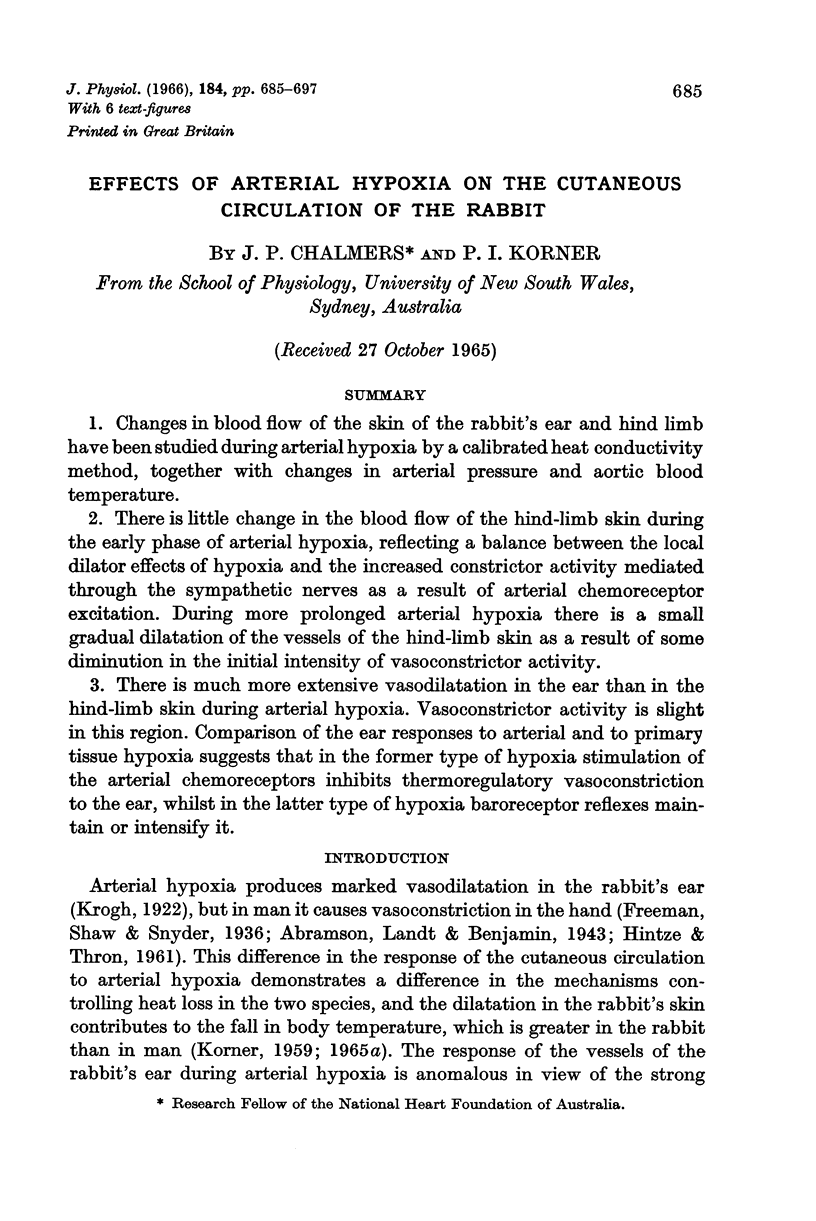
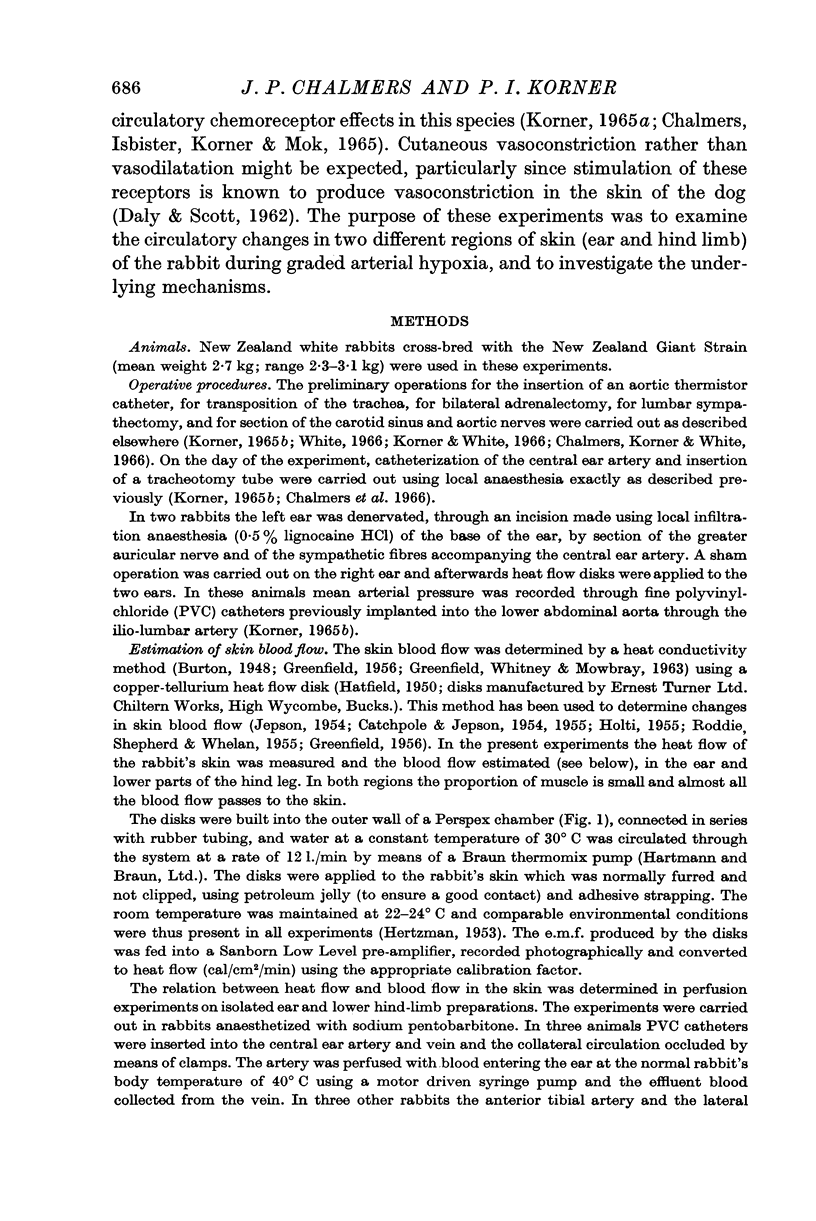
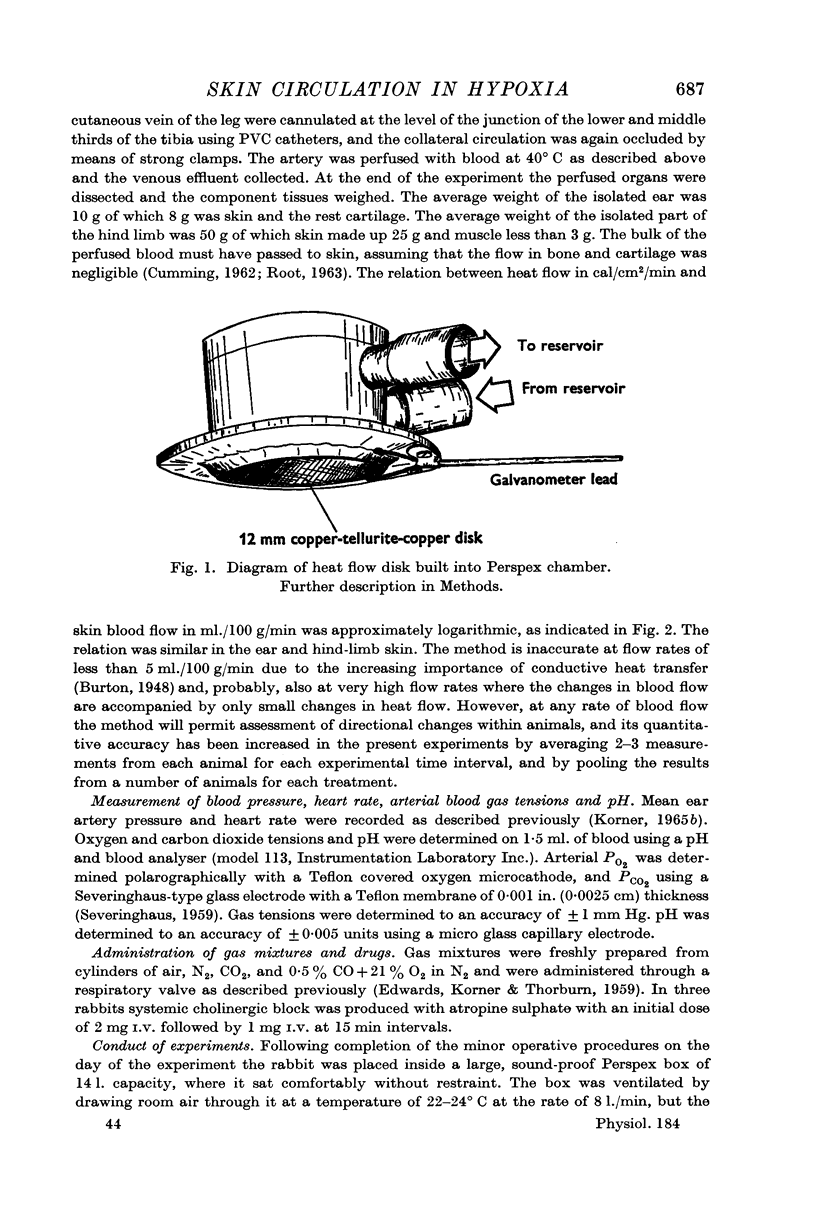
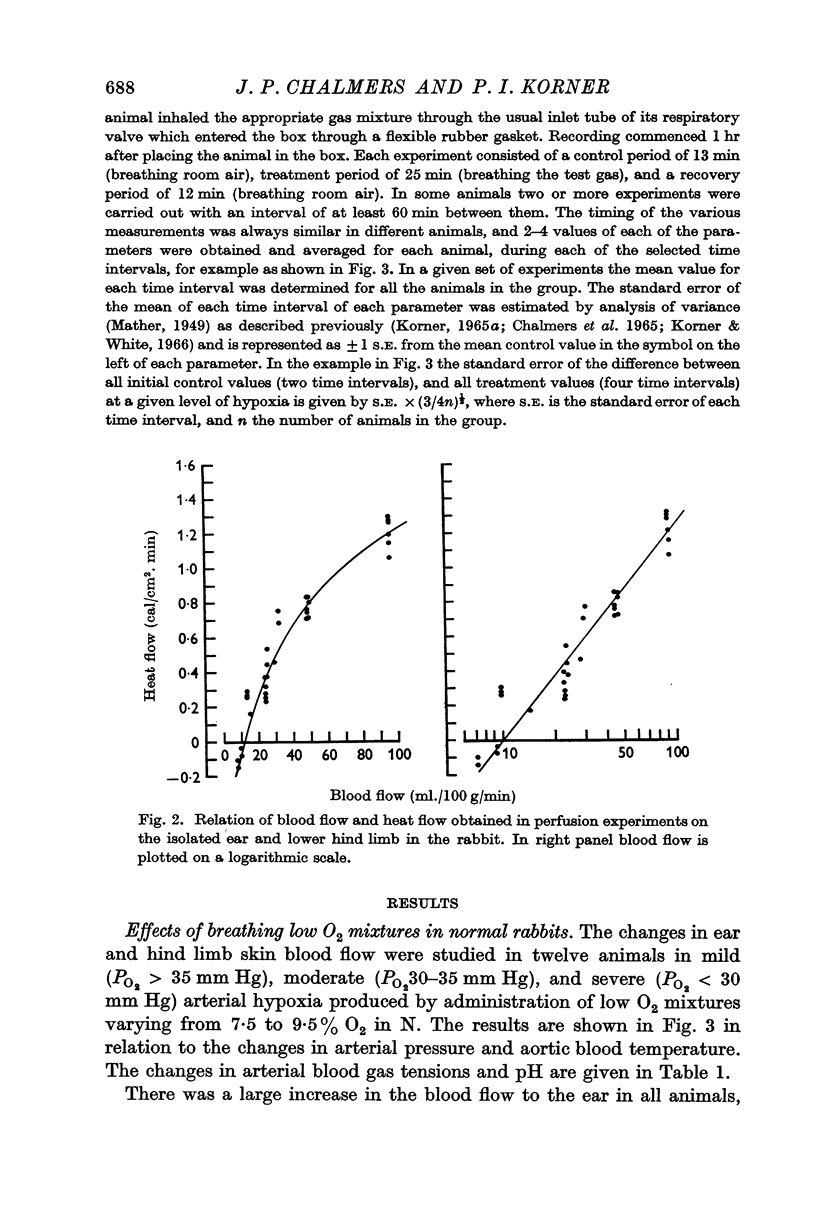
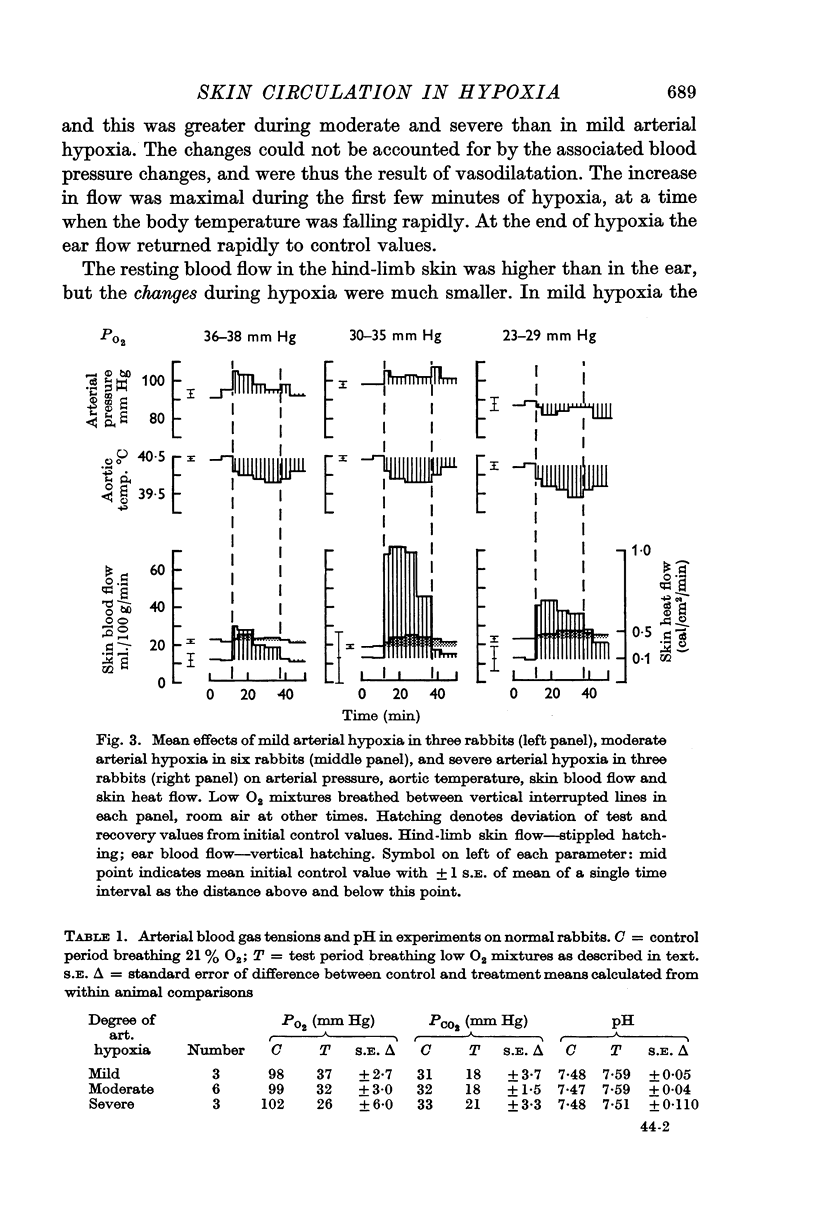
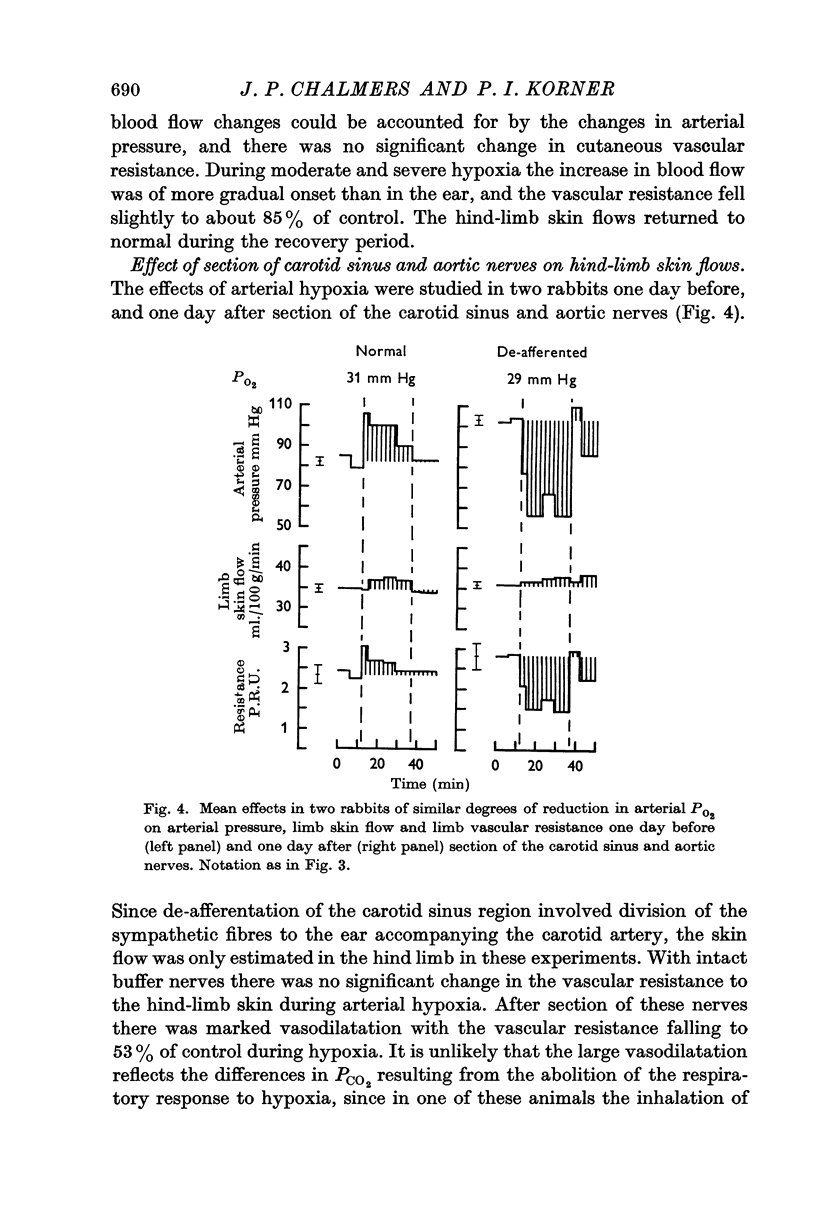
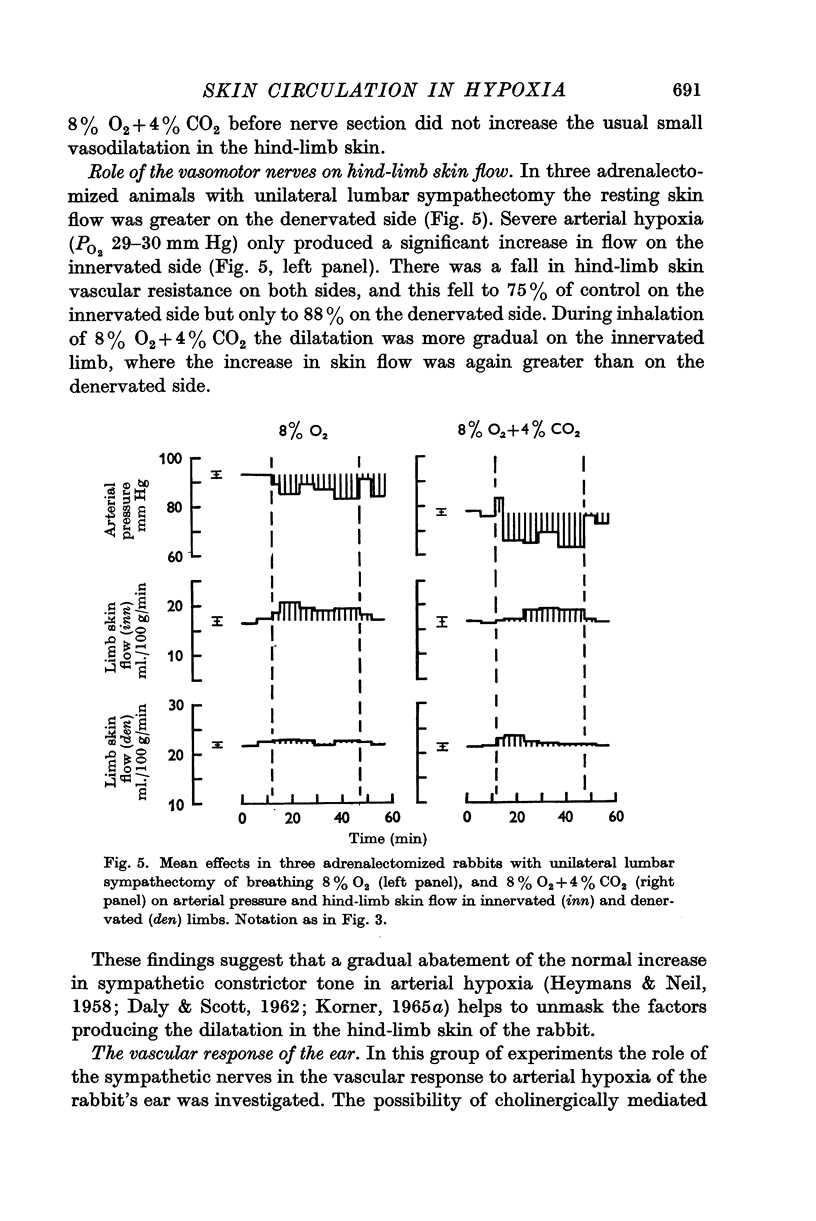
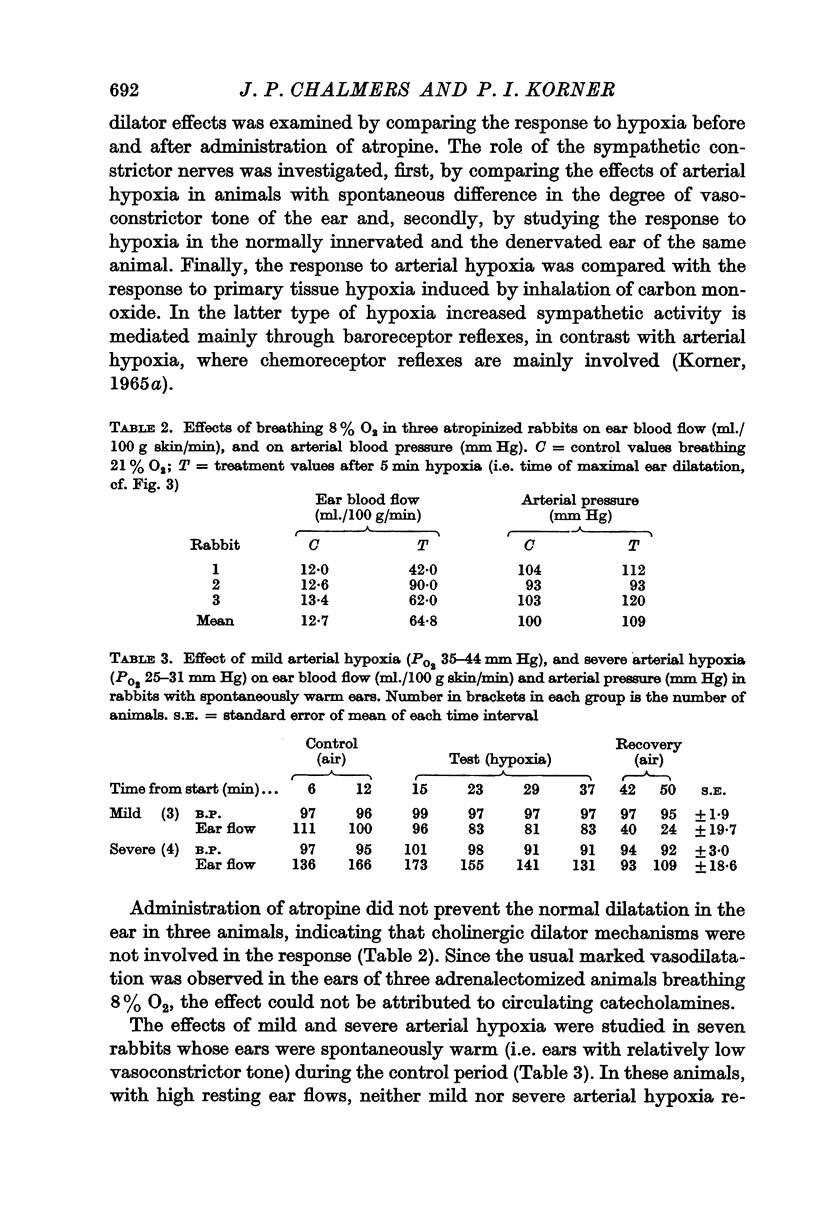
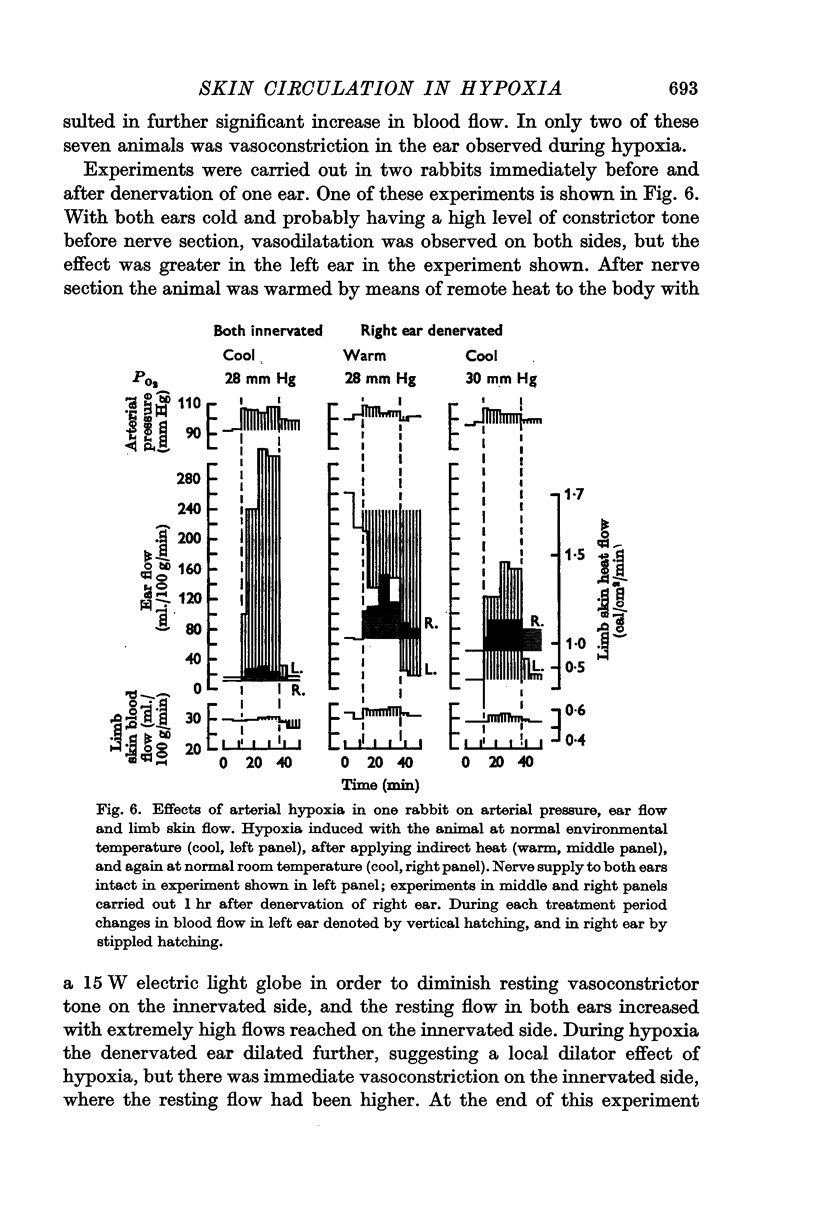
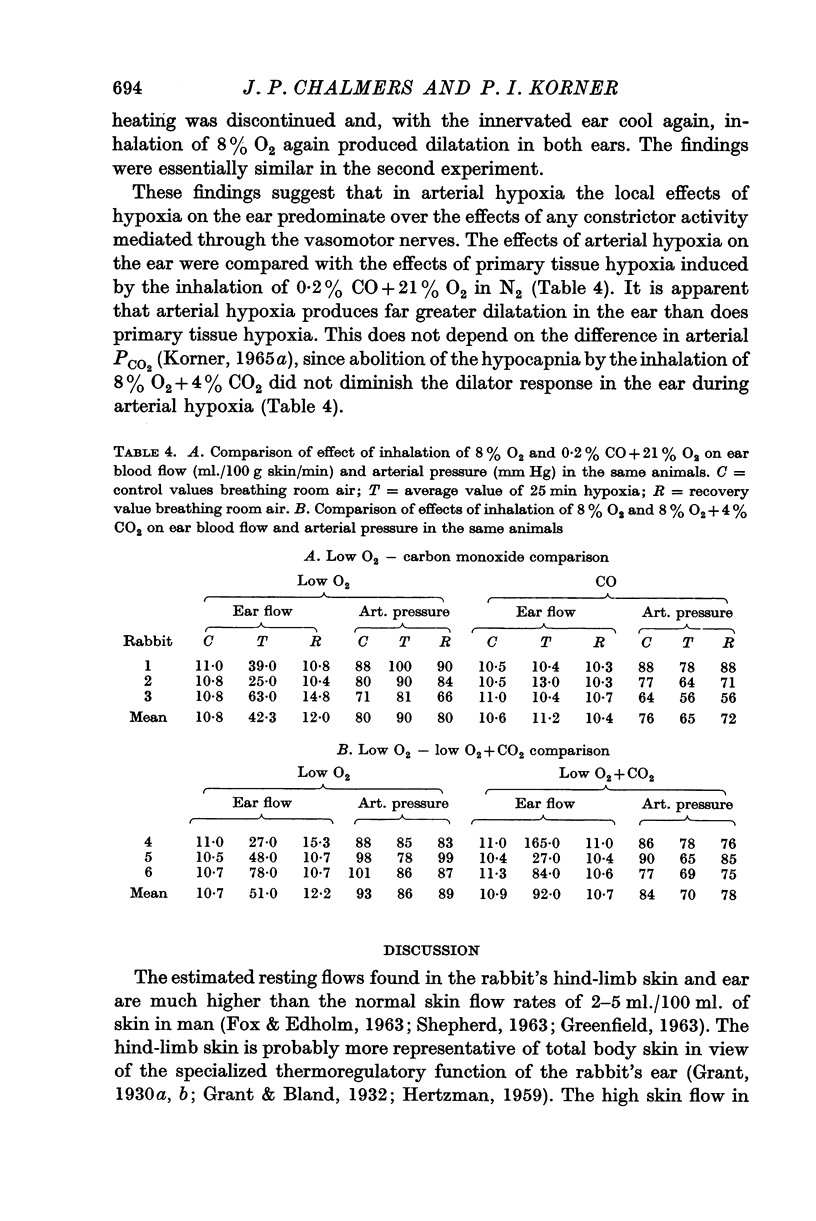
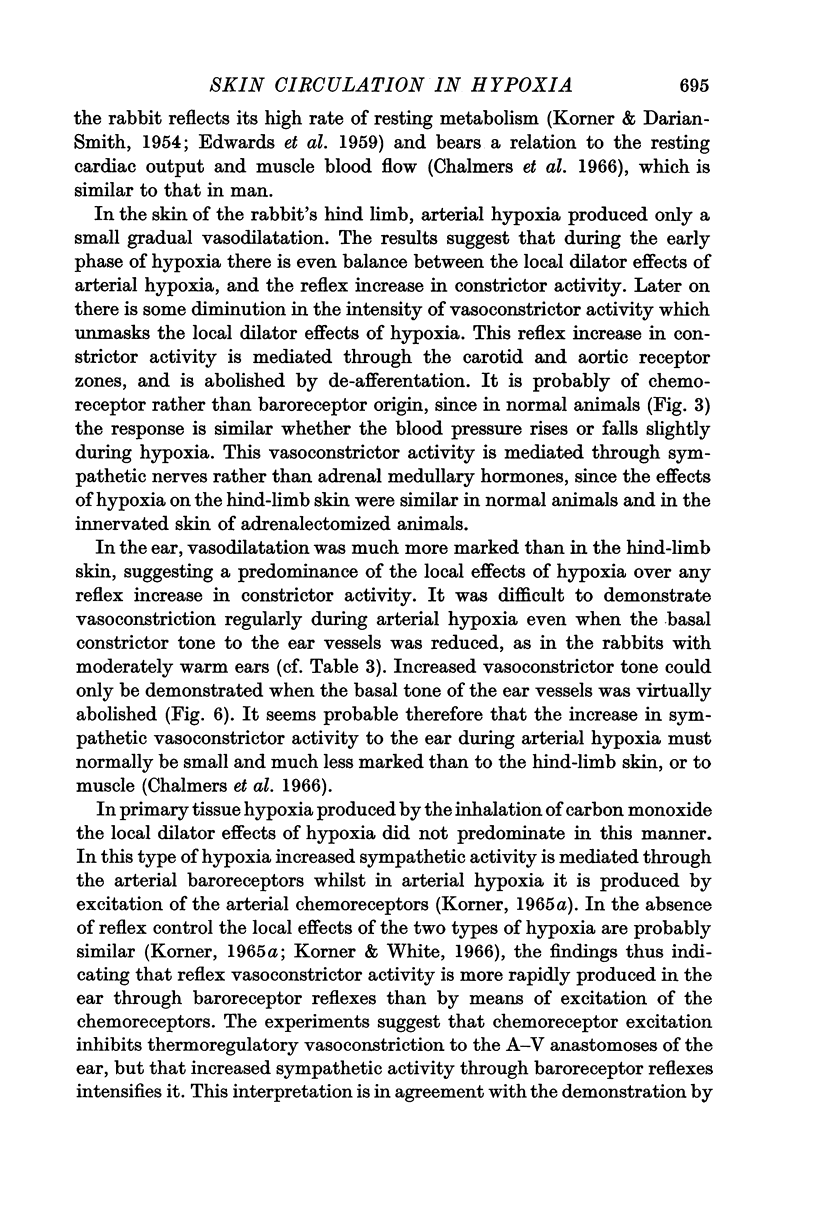
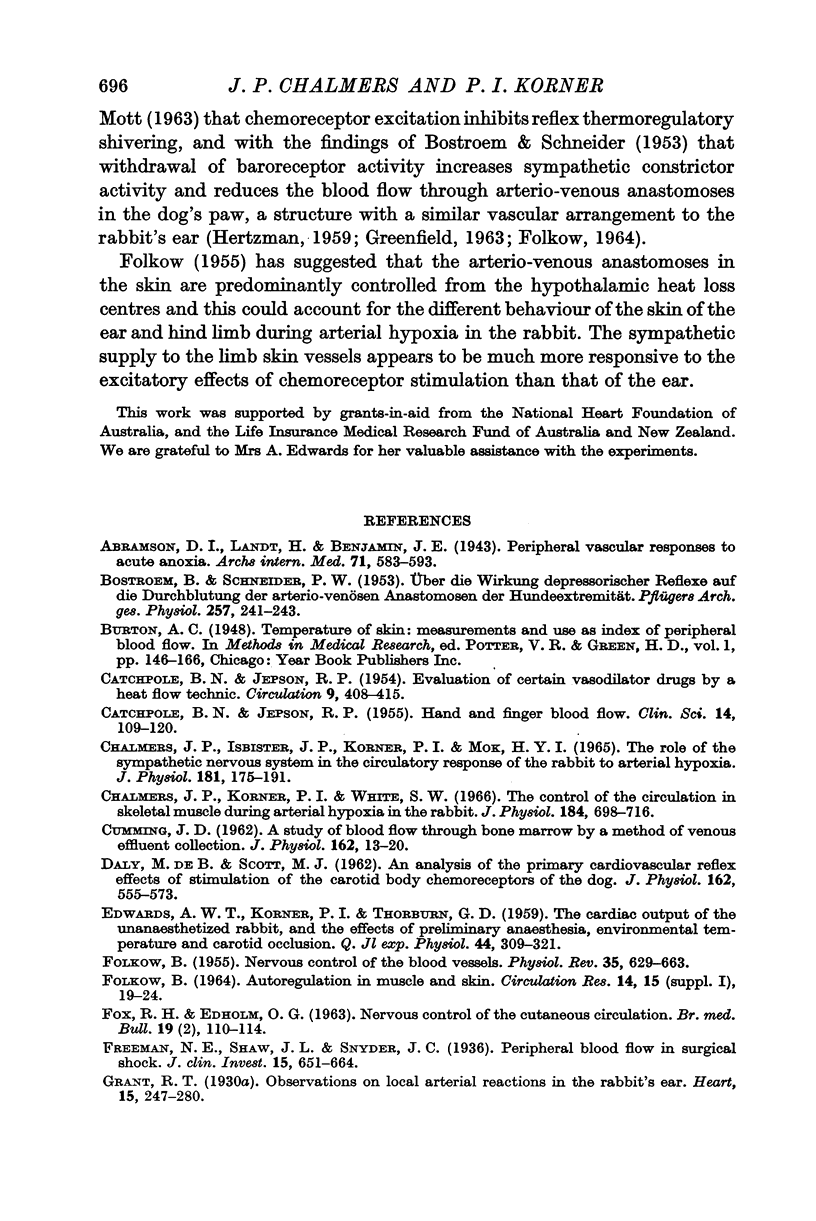
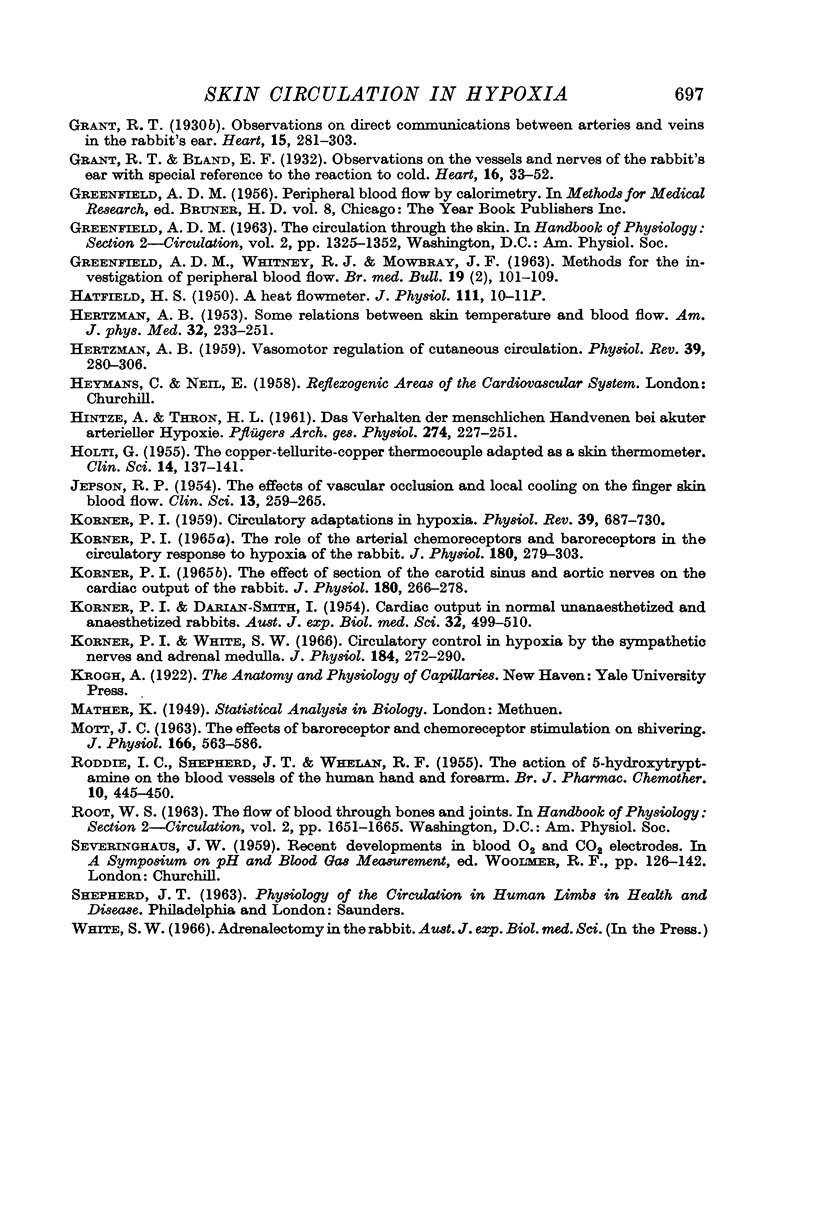
Selected References
These references are in PubMed. This may not be the complete list of references from this article.
- BOSTROEM B., SCHNEIDER P. W. Uber die Wirkung depressorischer Reflexe auf die Durchblutung der arterio-venösen Anastomosen der Hundeextremität. Pflugers Arch. 1953;257(3):241–243. doi: 10.1007/BF00370083. [DOI] [PubMed] [Google Scholar]
- CATCHPOLE B. N., JEPSON R. P. An evaluation of certain vasodilator drugs by a heat flow technic. Circulation. 1954 Mar;9(3):408–415. doi: 10.1161/01.cir.9.3.408. [DOI] [PubMed] [Google Scholar]
- CATCHPOLE B. N., JEPSON R. P. Hand and finger blood flow. Clin Sci. 1955 Feb;14(1):109–120. [PubMed] [Google Scholar]
- CUMMING J. D. A study of blood flow through bone marrow by a method of venous effluent collection. J Physiol. 1962 Jun;162:13–20. doi: 10.1113/jphysiol.1962.sp006909. [DOI] [PMC free article] [PubMed] [Google Scholar]
- Chalmers J. P., Isbister J. P., Korner P. I., Mok H. Y. The role of the sympathetic nervous system in the circulatory response of the rabbit to arterial hypoxia. J Physiol. 1965 Nov;181(1):175–191. doi: 10.1113/jphysiol.1965.sp007753. [DOI] [PMC free article] [PubMed] [Google Scholar]
- Chalmers J. P., Korner P. I., White S. W. The control of the circulation in skeletal muscle during arterial hypoxia in the rabbit. J Physiol. 1966 Jun;184(3):698–716. doi: 10.1113/jphysiol.1966.sp007942. [DOI] [PMC free article] [PubMed] [Google Scholar]
- DE BURGH DALY M., SCOTT M. J. An analysis of the primary cardiovascular reflex effects of stimulation of the carotid body chemoreceptors in the dog. J Physiol. 1962 Aug;162:555–573. doi: 10.1113/jphysiol.1962.sp006950. [DOI] [PMC free article] [PubMed] [Google Scholar]
- EDWARDS A. W., KORNER P. I., THORBURN G. D. The cardiac output of the unanaesthetized rabbit, and the effects of preliminary anaesthesia, environmental temperature and carotid occlusion. Q J Exp Physiol Cogn Med Sci. 1959 Jul;44:309–321. doi: 10.1113/expphysiol.1959.sp001403. [DOI] [PubMed] [Google Scholar]
- FOLKOW B. Nervous control of the blood vessels. Physiol Rev. 1955 Jul;35(3):629–663. doi: 10.1152/physrev.1955.35.3.629. [DOI] [PubMed] [Google Scholar]
- FOX R. H., EDHOLM O. G. Nervous control of the cutaneous circulation. Br Med Bull. 1963 May;19:110–114. doi: 10.1093/oxfordjournals.bmb.a070027. [DOI] [PubMed] [Google Scholar]
- Freeman N. E., Shaw J. L., Snyder J. C. THE PERIPHERAL BLOOD FLOW IN SURGICAL SHOCK: The Reduction in Circulation through the Hand Resulting from Pain, Fear, Cold, and Asphyxia, with Quantitative Measurements of the Volume Flow of Blood in Clinical Cases of Surgical Shock. J Clin Invest. 1936 Nov;15(6):651–664. doi: 10.1172/JCI100817. [DOI] [PMC free article] [PubMed] [Google Scholar]
- GREENFIELD A. D., WHITNEY R. J., MOWBRAY J. F. Methods for the investigation of peripheral blood flow. Br Med Bull. 1963 May;19:101–109. doi: 10.1093/oxfordjournals.bmb.a070026. [DOI] [PubMed] [Google Scholar]
- HERTZMAN A. B. Some relations between skin temperature and blood flow. Am J Phys Med. 1953 Aug;32(4):233–251. [PubMed] [Google Scholar]
- HERTZMAN A. B. Vasomotor regulation of cutaneous circulation. Physiol Rev. 1959 Apr;39(2):280–306. doi: 10.1152/physrev.1959.39.2.280. [DOI] [PubMed] [Google Scholar]
- HINTZE A., THRON H. L. [Behavior of the human hand veins in acute arterial hypoxia]. Pflugers Arch Gesamte Physiol Menschen Tiere. 1961;274:227–251. [PubMed] [Google Scholar]
- HOLTI G. The copper-tellurite-copper thermocouple adapted as a skin thermometer. Clin Sci. 1955 Feb;14(1):137–141. [PubMed] [Google Scholar]
- JEPSON R. P. The effects of vascular occlusion and local cooling on finger skin blood flow. Clin Sci. 1954 May;13(2):259–265. [PubMed] [Google Scholar]
- KORNER P. I. Circulatory adaptations in hypoxia. Physiol Rev. 1959 Oct;39:687–730. doi: 10.1152/physrev.1959.39.4.687. [DOI] [PubMed] [Google Scholar]
- KORNER P. I., SMITH I. D. Cardiac output in normal unanaesthetized and anaesthetized and anaesthetized rabbits. Aust J Exp Biol Med Sci. 1954 Aug;32(4):499–510. doi: 10.1038/icb.1954.52. [DOI] [PubMed] [Google Scholar]
- Korner P. I. The effect of section of the carotid sinus and aortic nerves on the cardiac output of the rabbit. J Physiol. 1965 Sep;180(2):266–278. doi: 10.1113/jphysiol.1965.sp007702. [DOI] [PMC free article] [PubMed] [Google Scholar]
- Korner P. I. The role of the arterial chemoreceptors and baroreceptors in the circulatory response to hypoxia of the rabbit. J Physiol. 1965 Sep;180(2):279–303. doi: 10.1113/jphysiol.1965.sp007703. [DOI] [PMC free article] [PubMed] [Google Scholar]
- Korner P. I., White S. W. Circulatory control in hypoxia by the sympathetic nerves and adrenal medulla. J Physiol. 1966 May;184(2):272–290. doi: 10.1113/jphysiol.1966.sp007915. [DOI] [PMC free article] [PubMed] [Google Scholar]
- MOTT J. C. The effects of baroreceptor and chemoreceptor stimulation on shivering. J Physiol. 1963 May;166:563–586. doi: 10.1113/jphysiol.1963.sp007123. [DOI] [PMC free article] [PubMed] [Google Scholar]
- RODDIE I. C., SHEPHERD J. T., WHELAN R. F. The action of 5-hydroxytryptamine on the blood vessels of the human hand and forearm. Br J Pharmacol Chemother. 1955 Dec;10(4):445–450. doi: 10.1111/j.1476-5381.1955.tb00102.x. [DOI] [PMC free article] [PubMed] [Google Scholar]


